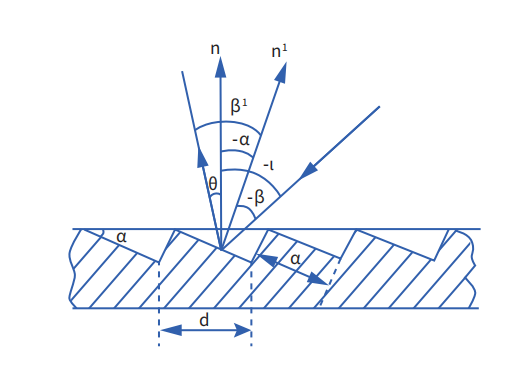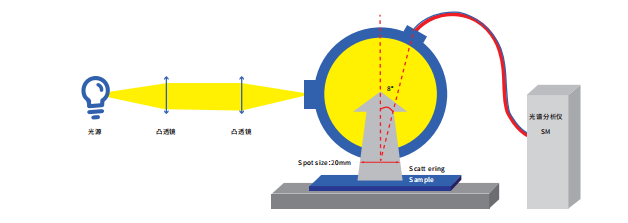
量子效率测试仪
PL/EL一体机
Sinton硅片少子寿命测试仪
Sinton硅块少子寿命测试仪
绒面反射率测试仪
3D共聚焦显微镜
在线四探针方阻测试仪
全自动扫描四探针方阻测试仪
在线薄膜厚度测试仪
晶化率测试仪
Horiba显微共焦拉曼光谱仪
傅里叶红外光谱仪
霍尔效应测试仪
分光光度计
全光谱椭偏仪
Horiba椭圆偏振光谱仪
TLM接触电阻率测试仪
超景深显微镜
网版智能影像测量仪
全自动影像测量仪
卧式拉力机
电池片稳态光衰老化试验箱
电池片紫外老化试验箱
电池片拉脱力综合测试仪
外观检验台
湿漏电测试系统
组件实验室EL测试仪
紫外老化试验箱
稳态光衰老化试验箱
电流连续性监测系统
PID测试系统
旁路二极管测试系统
LeTID测试系统
反向电流过载系统
脉冲电压测试系统
绝缘耐压测试仪
接地连续性测试仪
绝缘耐压接地测试仪
湿热环境试验箱
湿冻环境试验箱
热循环试验箱
动态机械载荷测试机
静态机械载荷测试机
冰雹冲击试验机
引出端强度试验机
霰弹冲击试验机
抗划伤(切割)测试机
剥离试验机
万能材料试验机(单臂)
万能材料试验机(双臂)
光伏玻璃透过率测试仪
醋酸测试试验箱
交联度测试系统
二极管接线盒综合测试仪
落球冲击试验机
半自动四探针
全自动探针式台阶仪
多通道太阳能MPPT系统
Horiba稳瞬态荧光光谱仪
大面积钙钛矿方阻椭偏二合一测试仪
大面积钙钛矿影像显微二合一监测站
钙钛矿P1激光划线测试仪
钙钛矿在线PL测试仪
钙钛矿在线方阻测试仪
钙钛矿在线膜厚测试仪
钙钛矿工艺检测工作站
手持式IV测试仪
便携式EL测试仪
手持热成像测试仪
户外组件多通道测试系统
光伏逆变器电能质量测试仪
无人机EL检测仪
IV测试仪
IVEL分选机
光学性质对制绒片材料光反射强度的影响及测试方法
日期:2024-05-20浏览量:410
测试制绒片对不同波长段的光反射强度涉及到多个方面,包括材料的光学性质、测量方法和技术等,制绒片反射强度受到材料本身特性等影响,如透射比、反射比和吸收比等。这些参数不仅是评估光学材料性能的重要指标,也是开发新型光电材料的关键依据。来自美能的RTIS绒面反射仪,可以测试制绒片对不同波长段的光反射率强度,并进行多点自动测量,最终以可视化曲线呈现测试结果,帮助客户监控电池片反射率、膜厚信息。

制绒片材料的光学性质,如透射比、反射比和吸收比,对其在不同波长下的光反射强度有显著影响。这些性质决定了材料如何处理入射光,包括允许通过(透射)、阻止通过(吸收)或改变方向反射(反射)。
透射比:透射比是指材料允许光线通过的能力。在短波长下,如紫外线区域,许多材料会显示出较高的透射比,因为这部分光谱通常与材料的电子结构相关,而电子结构在紫外线区域相对稳定。然而,在长波长,如红外线区域,透射比可能会降低,这是因为材料中的振动模式开始与光子的能量匹配,从而导致吸收增加。

光谱工作原理
反射比:反射比取决于材料的折射率和厚度。根据菲涅耳定律,反射比与入射角度有关,当角度达到临界角时,反射比可以降至零。此外,材料的折射率也会影响反射比,折射率越高,反射比越小。
吸收比:吸收比描述了材料吸收光能的能力。在某些波长上,材料可能会显示出特定的吸收峰,这是由于材料内部电子能级的特定跃迁。例如,某些材料在紫外线区域可能具有较高的吸收比,因为这个区域的光子能量足以激发电子从价带跃迁到导带。
考虑到多种因素影响,制绒片材料在不同波长下的光反射强度受光学性质的影响。美能绒面反射仪应运而生。该仪器不仅能够针对不同波长段的光,测试制绒片的反射率强度,测试范围同时可覆盖350-1050nm的波长范围,精确测量反射率、膜厚等多个重要参数。
制绒片在不同波长段的光反射强度、测量方法测试制绒片对不同波长段的光反射强度和测量方法涉及多种技术和设备。使用集成球探测器和准直聚焦单色光束来测量漫反射基底的全/半球面反射率和同时反射的辐射因子是一种有效的方法。积分球(integrating sphere)是一种用于测量材料反射、透射和吸收特性的设备,它通过在一个封闭的球形腔体内均匀分布光源并接收反射或透射后的光强来工作。在这种配置中,积分球可以用来测量漫反射,而准直聚焦单色光束则提供了必要的光源。在定向-半球光谱透射比和反射比测量实验研究中使用集成球进行漫反射测量的有效性。该研究建立了一个模型,考虑到测量过程中的替换误差,并通过理论计算对其进行修正,从而提高了测量的准确性这表明集成球设备不仅能够进行漫反射测量,而且还能够通过适当的校准和计算方法,提高测量结果的准确度。

反射率测试仪结构示意图
具体来说,当光线进入积分球时,部分光线会被样品吸收,而剩余的光线则会被样品表面反射。这些反射光线会在球体内部多次反射和散射,最终一部分光线会穿过球体壁并被探测器捕捉。探测器记录下来的光强度与原始入射光强度之比,即为样品的漫反射率。
美能RTIS绒面反射仪
美能RTIS绒面反射仪是太阳能电池片生产厂商工艺检测的重要帮手。可以测试制绒片对不同波长段的光的反射率强度,通过漫反射激发电池片,用8度角采用光谱仪进行检测。RTIS具有定位的机台和导轨,能够方便而快速地送入样品,实现电池片样品的定位,提高使用人员的工作效率。

联系:400-008-6690
光谱测试范围可达350-1050nm
快速、自动任意多点测量
每点测试速度约0.1s,检测时间仅为传统反射率的1/10
精准测量反射率、膜厚等多项重要参数
制绒片材料在不同波长下的光反射强度受其光学性质的综合影响。透射比、反射比和吸收比等因素相互作用,决定了光线在材料中的行为。美能绒面反射仪通过精确测试不同波长下的反射率强度,提供了一种可靠的测量方法。其广泛的测试范围和精准的参数测量使其成为研究光学性质及其影响的重要工具。在未来,随着对光学材料理解的不断深入,这样的测试设备将继续在材料科学和工程领域发挥关键作用。









































































